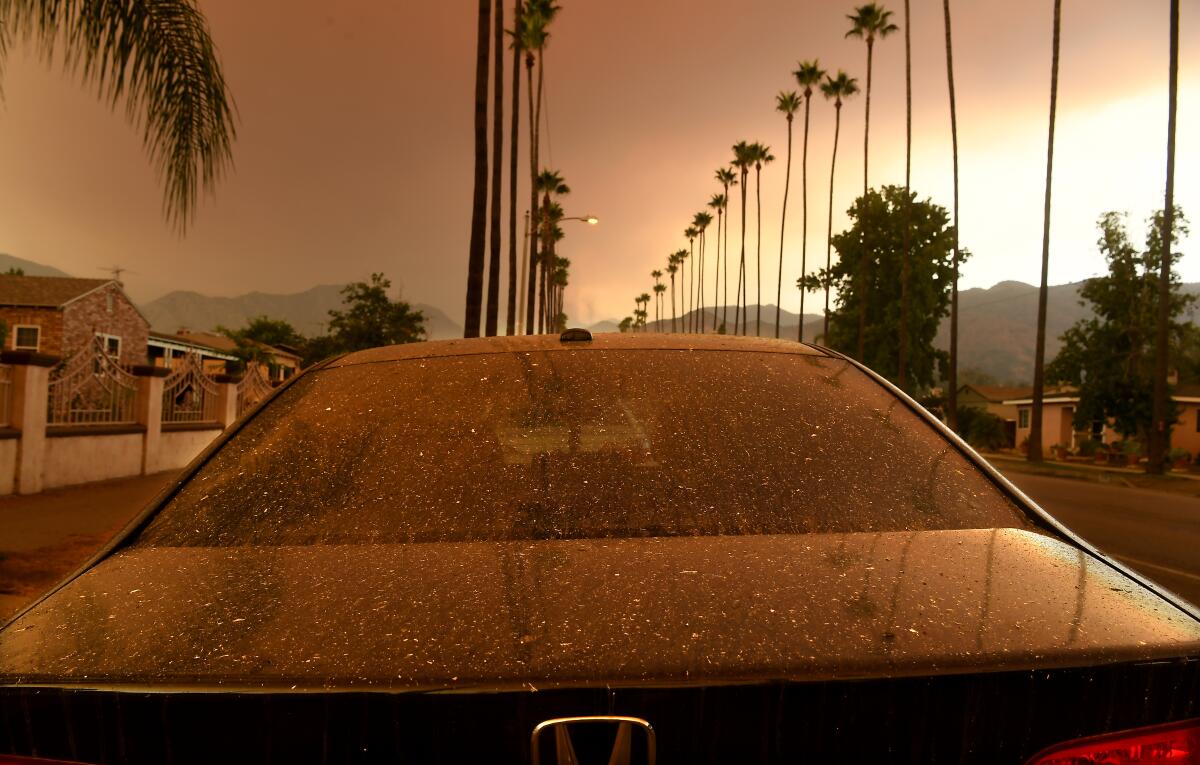Ashy apocalypse? No, just Labor Day weekend in Southern California

- Share via
Searing hot temperatures. Eerie yellow-gray skies. The sharp scent of smoke and flakes of ash that rained down upon the land.
No, it wasn’t the apocalypse. It was Labor Day weekend in Southern California — a fittingly strange and frightening capstone to a strange and frightening summer.
Angelenos were already on edge after six months of surrealism brought on by the global COVID-19 pandemic, but many were pushed to the brink of sanity this holiday weekend as temperature records were shattered in Woodland Hills (121), Chino (121), Topanga (118) and Pasadena (114).
Raging fires in the Angeles National Forest and Yucaipa added to the end-of-days vibe. And the National Weather Service’s warning that Santa Ana winds are likely to blow through Los Angeles and Ventura counties on Tuesday and Wednesday only upped the anxiety levels.
“Ashes everywhere. Horrible air. Extreme heat. Santa Ana’s expected tomorrow. COVID in the air. #enough2020,” Ana Flores of Duarte tweeted Monday, summing the situation up perfectly.
Californians across the Southland posted pictures of cars dusted with fine, papery ash and cinematic scenes of a ghostly orange sun peeking through the ubiquitous smoke.
People reported ash raining from the skies in the San Gabriel Valley, as well as in more-distant points like Glendale, Pico Rivera, Whittier and even Santa Monica and Redondo Beach.
“This is the only snow we get in LA,” Kelly Anne Greer tweeted alongside a picture of her ash-covered Toyota.
That falling ash doesn’t just look ominous. It may contain toxic chemicals, including some polycyclic aromatic hydrocarbons and metals such as arsenic or lead, that can be released from burned materials, said Nahal Mogharabi, director of communications for the South Coast Air Quality Management District.
“When we talk about the health effects of wildfire smoke, our primary concern is with inhalation of the small particles,” she said. “However, when it comes to ash, where the particles are generally larger, the concern is about toxics, which depends on the composition of the materials.”
The South Coast AQMD advised the public to avoid skin contact with ash that has fallen from the sky in the wake of a wildfire.
Do not clean up ash yourself if you have lung or heart problems, and never use leaf blowers to blast it away.
Instead, the AQMD recommends cleaning ash with damp cloths, or if it’s on your car, visiting a car wash.
The agency also said to direct ash-filled water to ground areas and away from the runoff system.
And as if all this ash, heat and fire weren’t bad enough, Ryan Ward, a graduate student in environmental engineering at Caltech, noted Sunday that the ground level ozone peaked at 200 parts per billion — well above the average healthy amount of 70 parts per billion.
“Absolutely crazy #atmoschem in Pasadena/LA today,” he tweeted alongside a picture of a piece of ash that had just fallen in the palm of his hand. “It’s time to put that sarcophagus back in the ground and return 2020 to regularly scheduled vibes!!”
More to Read
Sign up for Essential California
The most important California stories and recommendations in your inbox every morning.
You may occasionally receive promotional content from the Los Angeles Times.











